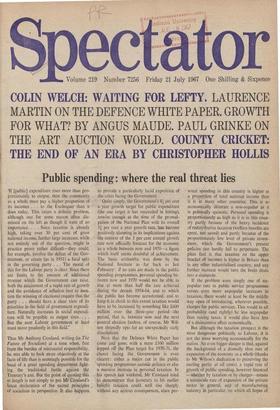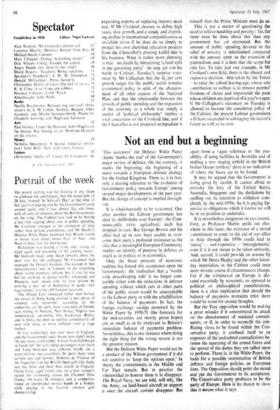Public spending : where the real threat lies
`If [public] expenditure rises more than pro- portionately to output, then the community as a whole must pay a higher proportion of its incomes . . . to the Exchequer than it does today. This raises a definite problem, although one for some reason often dis- missed on the left as though it were of no importance. . . . Since taxation is already high, taking over 30 per cent of gross national income, further large increases, while not entirely out of the question, might in practice prove rather difficult—they could. for example, involve the defeat of the Gov- ernment, or create (as in 1951) a fatal split in the governing party . . . The moral of this for the Labour party is clear. Since there are limits to the amount of additional revenue which the Government can raise, both the attainment of a rapid rate of growth and the avoidance of inflation (not to men- tion the winning of elections) require that the party . . . should have a clear view of its priorities in the field of government expendi- ture. Naturally increases in social expendi- ture will be possible as output rises. . . . But the next Labour government at least must move prudently in this field.'
Thus Mr Anthony Crosland, writing (in The Future of Socialism) at a time when, free from the burden of ministerial responsibility, he was able to look more objectively at the facts of life than is seemingly possible for the head of a great spending department ,fight- ing the traditional battle against the Treasury's axe. But the point of quoting this at length is not simply to put Mr Crosland's latest declaration of the sacred principles of socialism in perspective. It also happens to provide a particularly lucid exposition of the crisis facing the Government.
Quite simply, the Government's 41 per cent a year growth target for public expenditure (the one target it has succeeded in hitting), ,unwise enough at the time of the promul- gation of the National Plan with its overall 3 per cent a year growth rate, has become positively alarming in its implications against the context of the 3 per cent annual growth, rate now officially forecast for the economy as a whole between now and 1970—a figure which itself seems doubtful of achievement. The basic arithmetic was done by the National Institute as far back as last February: if no cuts are made in the public spending programmes, personal spending be- tween now and 1970 would not be able, to rise at more than half the rate achieved during the decade 1954-64, and to which the public has become accustomed; and to keep it in check to this extent taxation would have to be increased by something like £600 million over the three-year period—the period, that is, between now and the next general election (unless, of course. Mr Wil- son shrewdly opts for an unexpectedly early dissolution).
Now that the Defence White Paper has come and gone, with a mere £100 million lopped off the Plan target for 1970-71, the choice facing the Government is even clearer: either a major cut in the public spending programmes,outside defence or else a massive increase in personal taxation. In his speech last weekend, Mr Crosland tried to demonstrate that (contrary to his earlier beliefs) taxation could well 'rise sharply without any serious consequences, since per- sonal spending in this country is higher as a proportion of total national income than it is in many other countries. This is as economically illiterate a non-sequitur as it is politically quixotic. Personal spending is proportionately as high as it is in this coun- try partly because of the heavy incidence of redistributive taxation (welfare benefits are spent, not saved) and partly becatise of the proportionately low level of private invest- ment, which the Government's present policies can hardly fail to perpetuate. The plain fact is that taxation on the upper bracket of incomes is higher in Britain than in any other industrialised country, and any further increase would turn the brain drain into a stampede.
If the problem were simply one of un- popular cuts in public service programmes versus even more unpopular increases in taxation, there would at least be the middle way open of introducing, wherever possible, charges for public services. This would in all probability (and rightly) be less unpopular than raising taxes; it would also have less of a disincentive effect economically.
But although the taxation prospect is the most dangerous politically to Labour, it is not the most worrying economically for the nation. An even bigger danger is that, against the background of a dismally slow rate of expansion of the economy as a whole (thanks to Mr Wilson's dedication to preserving the sterling parity at all costs), a rapid rate of growth of public spending, however financed —whether by taxation or by charges—means a minuscule rate of expansion of the private sector in general, and of manufacturing industry in particular, on which all hopes of expanding exports or replacing imports must rest. If Mr Crosland chooses to define high taxes, slow growth, and a steady and dispirit- ing decline in international competitiveness as socialism (even if he does do so simply to protect his own cherished education projects from the Chancellor's pruning knife) that is his business. What is rather more alarming is that—no doubt by threatening 'a fatal split in the governing party'—he may yet win his battle in Cabinet. Tuesday's surprise state- ment by Mr Callaghan that the 44- per cent growth target for the public sector remains government policy in spite of the abandon- ment of all other aspects of the National Plan, and that the relationship between the growth of public spending and the expansion of the economy as a whole was simply a matter of `political philosophy' implies a total concession to the Crosland line, and if the Chancellor is not prepared to repudiate it himself then the Prime Minister must do so.
This is not a matter of questioning the need to relieve hardship and poverty: far, far more must be done about this than any government has yet attempted. But the amount of public spending devoted to the -relief -of poverty is infinitesimal compared with the amount spent on the extension of paternalism; and it is here that the scope for cuts lies. To take just one example, in Mr Crosland's own field, there is the absurd and expensive decision—first taken by the Tories —to raise the school leaving age, whose sole contribution to welfare is to remove parents' freedom of choice and impoverish the -poor whosoebildren areaeprived of a year's wages. If Mr Callaghan's statement on Tuesday is allowed to become the considered policy of the Cabinet, the present Labour government will have succeeded in sabotaging the nation's future as well as its own.































